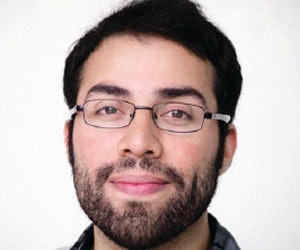In the heady, complex and intense world of neuroscience, Dr. Steve Ramirez thrives on having a research team that finds genuine enjoyment in working together.
For Ramirez, the brain is uncharted territory.
 Dr. Steve Ramirez
Dr. Steve Ramirez“It’s that pure excitement of feeling like you’re a scavenger trying to figure out how this thing works,” says Ramirez, whose research aims to redefine how the world understands neurological functions such as post-traumatic stress disorder, depression and dementia.
He is exhilarated about taking on the challenge of exploring how billions of brain cells communicate with each other. Ramirez describes today’s science as a “blossoming era” where ways of listening to the brain and modulating its activity are experiencing breakthroughs.
In the lab, he and his team will explore the novel circuitries that exist in the brain and try to figure out what happens when they break down. One of his goals is to find novel ways of intervening with the brain, ideally noninvasively, and resetting an abnormal brain back to baseline.
As an undergraduate researcher in the lab of Dr. Howard Eichenbaum at Boston University (BU), Ramirez explored ideas and got a sense of what a research scientist does. In graduate school, Dr. Susumu Tonegawa at MIT showed him what it actually means to work as a team and be fearless in asking the questions.
“That’s where I really fell in love with neuroscience, when I saw what it meant to do it with other likeminded people,” says Ramirez.
Camaraderie is a dynamic presence in Ramirez’s research — working together toward discovery, troubleshooting problems and celebrating discoveries collectively. He built his lab at BU with upbeat scientists. Rather than traditional interviews, he engaged people in informal conversations to get to know them.
Personal fulfillment and connections are of great value. It was important to Ramirez to find a position in the Boston area so he could remain near family and friends. He describes his parents and siblings as optimists who provide emotional support. When you’re surrounded by that mentality, it’s easier to push through the disappointments that occur in research science, he says.
“If I’m happy in my real world daily routine, that’s going to trickle down to the lab,” he notes.
If an experiment fails, Ramirez says it is worth talking to other people who’ve gone through similar situations who can empathize and offer encouragement.
“There is a real human element that goes into the heart of what it means to do science,” Ramirez says. “As academics, we kind of ignore it a lot, but by embracing that humanity component, it’s easier to stay upbeat.”
Ramirez loves to attend an annual symposium held by National Geographic, where people come from all over the world to present research. Hearing about the diverse and complex research invigorates him.
Personal fulfillment and connections are of great value. It was important to Ramirez to find a position in the Boston area so he could remain near family and friends. He describes his parents and siblings as optimists, who provide emotional support. When you’re surrounded by that mentality, it’s easier to push through the disappointments that occur in research science, he says.
“If I’m happy in my real world daily routine, that’s going to trickle down to the lab,” he notes. If an experiment fails, Ramirez says it is worth talking to other people who’ve gone through similar situations who can empathize and offer encouragement. “There is a real human element that goes into the heart of what it means to do science,” Ramirez says. “As academics, we kind of ignore it a lot, but by embracing that humanity component, it’s easier to stay upbeat.”
Ramirez loves to attend an annual symposium held by National Geographic, where people come from all over the world to present research. Hearing about the diverse and complex research invigorates him.
Ramirez began work at BU in July 2017 when he moved his lab, the Ramirez Group, from Harvard University, where he had been a junior fellow. The creation of the lab was made possible by a National Institute of Health Early Independence Award. In addition to himself, there are 13 people — post-doctorates, technicians, one graduate student and two undergraduates — working in the lab. Rather than being secretive about research and acting in fear that an idea could be stolen, Ramirez builds alliances and promotes cooperation. No one has to ask permission to talk publicly about an experiment.
Most days, Ramirez prefers to work in the lab rather than his office. He is available to answer questions, keep a harmonious atmosphere and feed off and fuel positive energy. He meets with everyone individually once a week and has weekly group meetings.
“It does require that level of attention to personal detail. When you do that, it’s easy to have the group mesh well together,” he says. His first year at BU is dedicated to establishing his lab. Ramirez will begin teaching courses in the 2018-19 school year, intending to listen to his students and take their questions individually and seriously. As he moves forward in his career, his priority is the science.
“The brain has billions of projects left for us to do,” says Ramirez. “We just have to get creative.”
Dr. Steve Ramirez
Title: Assistant Professor, Psychological & Brain Sciences, Boston University
Tenured: No
Education: B.A., Boston University; Ph.D., Massachusetts Institute of Technology
Age: 30
Career mentors: Dr. Howard Eichenbaum, Boston University; Dr. Chris MacDonald, Boston University; Dr. Susumu Tonegawa, Massachusetts Institute of Technology; Dr. Xu Liu, Massachusetts Institute of Technology
Words of wisdom/advice for new faculty members: Everyone doesn’t have to follow the traditional trajectory of post-doctoral fellow to faculty unless that’s what their heart desires. Keep other possibilities in mind — from consulting to science journalism — and be proactive in exploring those career options. For those in academia, “surround yourself with people that care about you, and taking care of yourself is really important.”





















